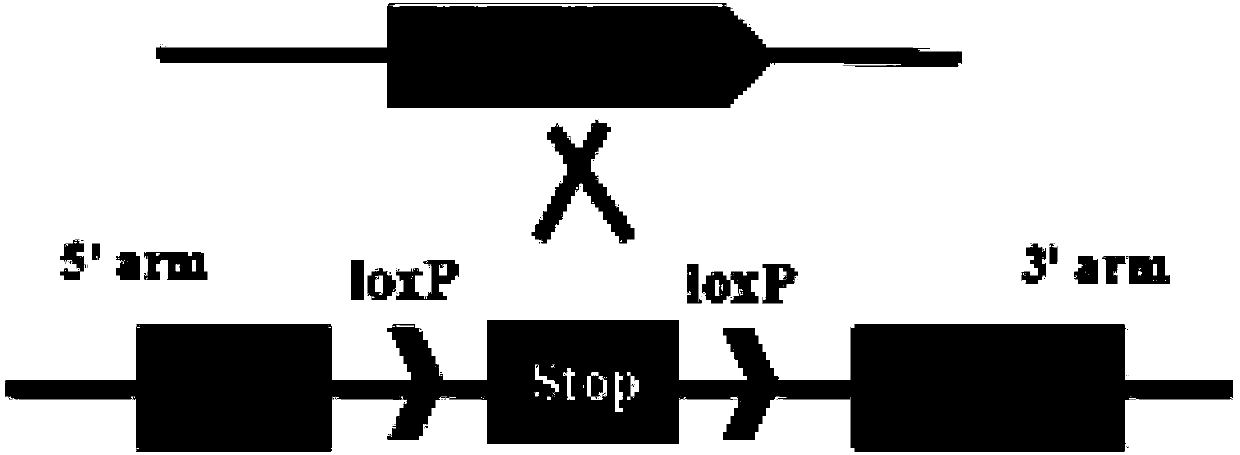Construction method and application of incoordination animal model
An animal model, ataxia technology, applied in the field of medical engineering, can solve problems such as lack of animal models
- Summary
- Abstract
- Description
- Claims
- Application Information
AI Technical Summary
Problems solved by technology
Method used
Image
Examples
Embodiment 1
[0046] In this embodiment, taking mice as the target animal, the method for constructing the animal model of ataxia provided by the present invention is described, specifically as follows.
[0047] 1. Refer to the method of the Chinese patent application No. 2017103803265, named the construction method and application of the mouse model of pancreatic beta cell conditional knockout of Tmem30a gene, to obtain the conditional knockout of Tmem30a gene (exon No. 3) homozygous small mouse;
[0048] 2. The Tmem30a gene conditional knockout homozygous mice were mated with the Pcp2-Cre gene transgenic mice to obtain the cerebellar Purkinje cell conditional knockout Tmem30a gene mice ( figure 1 A). Such as figure 1 As shown in A, Pcp2-Cre transgenic mice were mated with Tmem30a gene knockout homozygous mice, and half of the offspring carried both Pcp2-Cre and Tmem30a conditional knockout mice. The animal was mated with a Tmem30a gene knockout homozygous mouse to obtain a cerebellar P...
Embodiment 2
[0051] In order to determine the recombination efficiency of Cre-mediated loxP sites, this embodiment constructed the tdTomato reporter gene ( figure 2 ). In the absence of Cre, the STOP gene cassette with loxP recombination sites on both sides can prevent the expression of the downstream red fluorescent protein tdTomato. When Cre exists, the STOP gene box is removed in Cre-specifically expressed tissues, resulting in the expression of tdTomato, so the expression position and expression efficiency of Cre recombinase can be determined by observing the fluorescence generated by tdTomato expression. Using immunohistochemistry, it was observed that Cre was specifically expressed in cerebellar Purkinje cells in Tmem30a KO animals (e.g. image 3 shown). image 3 The middle mark refers to: GCL: Granular cell layer, granular cell layer; PCL: Purkinjecell layer, Purkinje cell layer; ML: Molecular layer, molecular layer).
[0052] Immunohistochemical method:
[0053] After the mice...
Embodiment 3
[0056] The expression of TMEM30A protein in Tmem30a KO mice was verified by western blot (WB).
[0057] Western blot method:
[0058] ①Separate retinal tissues from wild-type and mutant mice, place them in 1.5ml centrifuge tubes, and add 200μl protein lysate RIPA;
[0059] ② After ultrasonically disrupting the retinal tissue, lyse it on ice for 20 minutes;
[0060] ③ After centrifugation at 16,000 g for 10 min at 4°C, transfer the supernatant to another clean centrifuge tube, add 50 μl protein sample solution, mix well and heat at 95°C for 5 min;
[0061] ④ After the samples are cooled, take 20 μl respectively and conduct polyacrylamide gel electrophoresis (SDS-PAGE) at 160V to separate proteins;
[0062] ⑤ After the SDS-PAGE is finished, cut the nitrocellulose membrane of appropriate size according to the needs, spread the filter paper, glue, nitrocellulose membrane and filter paper in order, and drive away the air bubbles, put the transfer membrane tank in the ice water ba...
PUM
 Login to View More
Login to View More Abstract
Description
Claims
Application Information
 Login to View More
Login to View More - R&D
- Intellectual Property
- Life Sciences
- Materials
- Tech Scout
- Unparalleled Data Quality
- Higher Quality Content
- 60% Fewer Hallucinations
Browse by: Latest US Patents, China's latest patents, Technical Efficacy Thesaurus, Application Domain, Technology Topic, Popular Technical Reports.
© 2025 PatSnap. All rights reserved.Legal|Privacy policy|Modern Slavery Act Transparency Statement|Sitemap|About US| Contact US: help@patsnap.com



